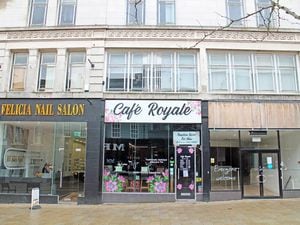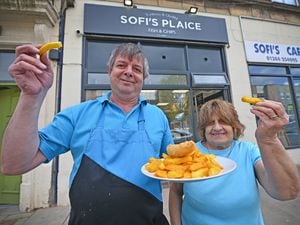Real life: Living in a box - the shipping containers made into homes
TV presenter Max McMurdo is living the upcycling dream after selling his house and moving. . . into a shipping container.
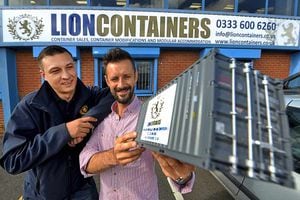
In pursuit of his minimalist-living credo, the amiable eco guru travelled to Walsall firm Lion Containers where staff transformed a used shipping container into a floating home for him.
The chic des-res is the latest to be added to the firm's rapidly growing list of quirky things you can make out of a big steel box.
The humble rectangle, originally designed to be moved from ship to lorry without the need to unpack and reload, has taken on many new guises.
While still used for storage – the firm supplied loads for the newly revamped Walsall Market – the familiar corrugated container, when unloaded, is increasingly recycled in a whole range of imaginative ways.
They become offices, art galleries, beach snack shops, football stadium bars, classrooms, garden 'sheds', exhibition stands, festival stages and sports changing rooms, to name only a few.
The most original request so far has been for a two-storey shop/canteen designed to look like a 1980s boom-box for a Hereford skate park.
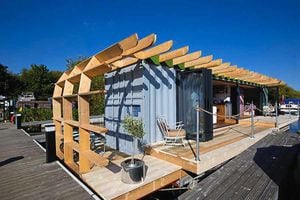
You can stack them – the BBC ordered a three-storey unit for a broadcast studio during the Glasgow 2014 Commonwealth Games. And you can cut them up to add extensions to other containers.
They are even helping to alleviate the housing crisis. In Bristol and the East End of London, the YMCA have converted shipping containers to provide accommodation for young homeless people, and a housing trust in Brighton has ordered 36 units to provide cheap homes.
Lion Containers, which recently moved from Bridge Street in Walsall to Cannock, attracted Max McMurdo's attention with its travel hub for the University of the West of England.
What was different about that job was the way part of the unit was left exposed, showing off the fact that it was simply a shipping container. He had already adopted the same philosophy with his houseboat.
The eco designer, who found fame when he brought his upcycling firm restore to the Dragons' Den, came knocking on their door and the Walsall business now supplies garden offices, classrooms, café courtyards and, latterly, houseboats for his offshoot company retainer.
The key to his custom-built 40ft floating home was not only maintaining the original form of the container but celebrating its former glory as a load lugger, while adding modern fittings, solar power, a green roof and some stylish touches such as artificial grass and stunning bi-fold doors.
Max, who has just finished a stint as judge on Channel 4's Shed of the Year, says: "It would have been far too easy to simply clad the exterior in wood to hide the containers' origins but that's missing the point.
"With recycling on everyone's agenda, we should be proud of re-using old objects such as the container which is naturally beautiful."
Cannock-converted containers have twice been featured on the TV programme George Clarke's Amazing Spaces via Max.
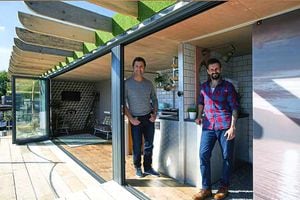
For Laura Hucker, aged 29, who was instrumental in setting up the company four years ago , and her sister Sophie Day, 33, who came on board a year later, the link-up with Max has been huge in terms of exposure for their company.
Laura was already working in the industry when she decided to go it alone while big sister Sophie, previously in the decidedly unglamorous heating and ventilation world, brought her considerable marketing skills to the new venture.
The firm now sells 13,000 containers a year, has a £6 million annual turnover and has won several awards.
Sophie says: "In terms of PR, Max is the biggest thing to happen to us. He's a really fun person, no airs and graces, very relaxed. He comes into the office and chats to everyone. Just lately we've been discussing projects for future shows with him, which is great.
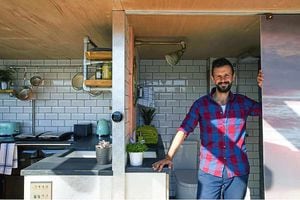
"It's different from what we normally do. Our main work is bespoke projects, making to order from scratch while, with Max, people can see what they're getting. They may want a different sink unit or wall lining but you're basically getting what you see."
In terms of solving the housing crisis, buying a shipping container is not as straightforward a solution as it may look unless you own land. "You have to have somewhere to put it, and there are building regulations to consider, it can get as involved as buying a house," says Sophie.
"But if someone wants to create a living space as an extension to their property, like extra bedrooms or a garden office, a garage extension to house a classic car, a craft workshop, a man-cave, that's where they're really useful.
"People love them as homes because they can be so cosy. You put big patio windows in, some nice lighting and it's great stand-alone living. You don't need planning permission unless it is going to be a permanent structure and we have a buy-back scheme if people only want them, say, for a year."

The price varies from around £800 to £2,000 for a 10ft x 8ft unit with lining and marine ply flooring, £1,000 to £2,000 for a 20ft x 8ft, and £1,500 to £3,000 for a 40ft by 8ft.
One of the firm's biggest recent jobs has been to supply custom-built containers with glass frontages for a new harbourside development in Bristol, where a series of high-profile businesses, including a Michelin-starred restaurant, are lining up to move in.
They are also popular at music festivals. Their first was the Bloc Festival at London Pleasure Gardens in 2012, where 74 giant containers were positioned around the main stage to create a formidable sound experience.
Sophie says: "Putting case studies on our website got a lot of attention. When the inquiries started flying in, we had to learn very quickly. We realised this could be a really serious business for us, so we sent ourselves off on courses – marketing, web design, lots of sales training courses. The sales guys learn about fabrication and welding so when customers call, they know what they're talking about."
This week the girls learned they had been nominated for a Women In Build business award, which tickled them.
Sophie says: "Growing up in Brownhills I don't think it ever crossed our minds that we would end up running a business, and although we have a 50-50 split in our firm, it's quite a male-dominated industry. But we were brought up to believe we were as good as anyone else, and that there was nothing we couldn't do because we were female, so we're chuffed."
By Marion Brennan

